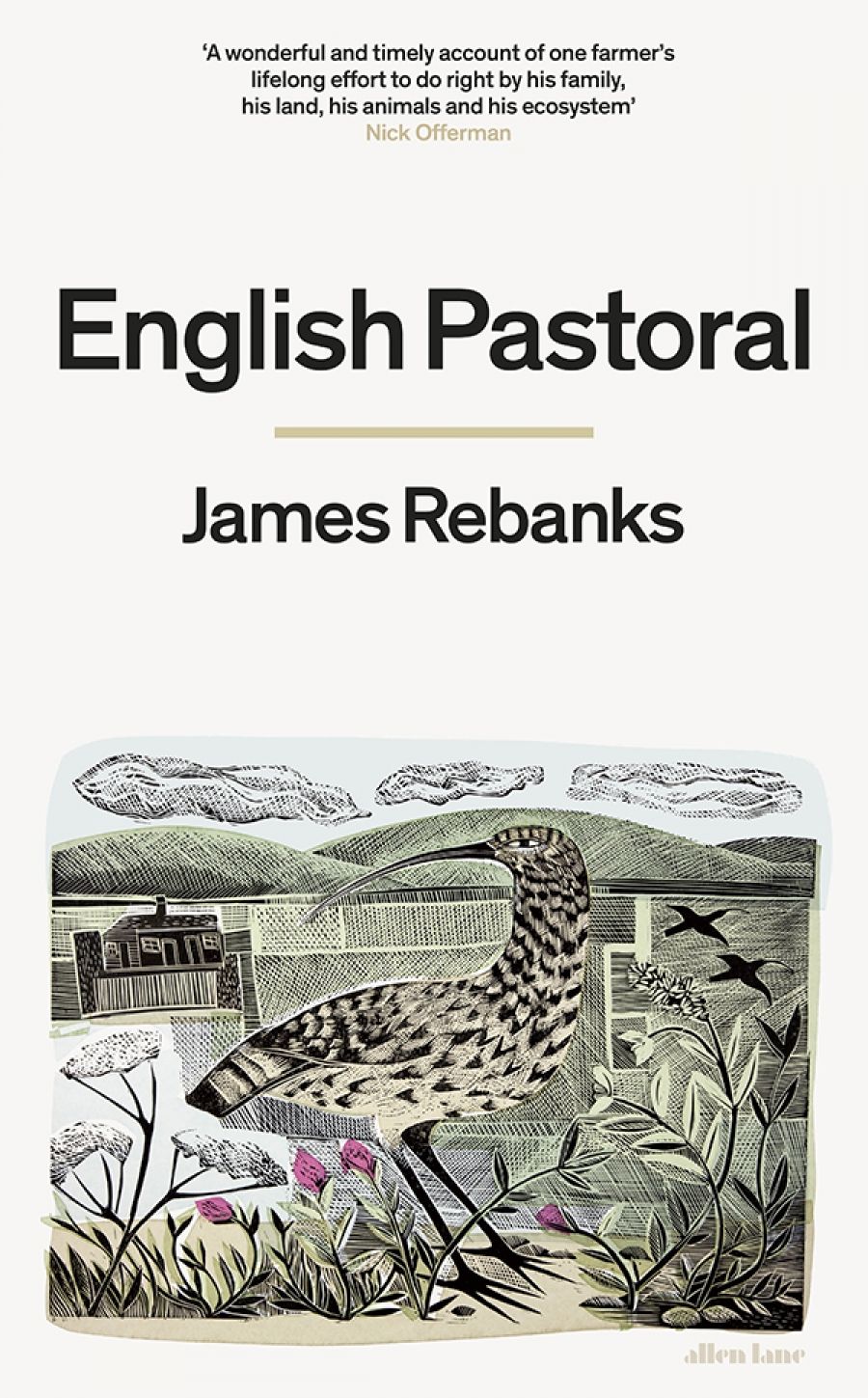
- Free Article: No
- Contents Category: Environmental Studies
- Review Article: Yes
- Article Title: The only game in town
- Article Subtitle: Rejecting the cult of intensive farming
- Custom Highlight Text:
Modern mega-farms are like nothing on earth. Imagine a vast black field stretching from horizon to horizon. A driverless tractor glides across the skyline spreading synthetic fertiliser. A cluster of grain towers looms over an empty asphalt parking lot. A row of pig sheds gleams in the distance. The square blot of the manure lagoon simmers in the hot sun. There are no trees. No birds. No mess. Everything is orderly, unpeopled, and entirely alien.
- Grid Image (300px * 250px):

- Book 1 Title: English Pastoral
- Book 1 Subtitle: An inheritance
- Book 1 Biblio: Allen Lane, $35 pb, 304 pp
- Book 1 Readings Link: booktopia.kh4ffx.net/5RnJo
The farm was run according to a traditional pastoral system that mimicked what worked in nature. His grandfather thought, like thousands of shepherds and cowherds before him, that cattle and sheep were healthiest when they were either moved around a range of habitats or left to roam across open landscapes. The modern preference, of course, is to keep the animals permanently indoors, dosing them with antibiotics to keep them healthy.
English Pastoral is the second book by Rebanks. In his first, The Shepherd’s Life (2015), he offered a collage of beautifully observed vignettes of the life of a Cumbrian sheep farmer. He also celebrated his family’s long connection to the region, where they have worked for more than six generations, and he railed against the romanticisation of the Lake District. In particular, he lamented the impact of tourists and tree-change blow-ins on traditional ways of life.
This new book is, like The Shepherd’s Life, a seductive mix of passionate argument and lyrical description. Here his target is the modern cult of intensive farming. Rebanks admits that, like many farmers of his generation, he was initially enthusiastic about the potential benefits of the new way. Under his grandfather’s influence, he eventually fell in love with the old farming world and turned his back on the gospel of productivity.
His grandfather took the idea of environmental stewardship seriously. He was attentive to what lived on the margins, along the hedges and lanes, around the barns and byres. He knew that even the pests were important for measuring the health of the land. The rats and the rabbits and the dog fox among the turnips were all signs of vitality. They needed to be kept down, but if they disappeared completely then it would mean that something was amiss.
Rebanks eventually inherited his grandfather’s farm and knows all too well that the old ways, while ecologically more sustainable, are not financially sustainable. Intensive farming is now the only game in town. Since the 1960s, supermarket conglomerates across the world have driven down the prices. Consumers now demand not just a sufficient supply of food but a sufficient supply of cheap food. Families today spend less of their average income on food than ever before. And so, Rebanks says, we get business-school thinking applied to the land. Ethical and environmental issues are sidelined and traditional farming cultures are allowed to wither. Farmers now resemble middle managers and experience few of the bucolic satisfactions of their forebears. Indeed, with the rise and rise of large corporate agricultural companies, it seems clear that the farms of the future will not need farmers, only flexible employees with no essential connection to the land.
Rebanks had his first glimpse of this future in his early twenties when he worked on a large farm in Australia. There he found vast, perfect fields. The bush had been cleared a century ago and a neat grid had been laid down by surveyors. ‘There was no history to slow anything down. Or none that was spoken of. It was a blank slate on which these modern farmers were writing the future. No old walls. No old farmsteads. No people. No bones of older things poking out through the new. Just flat fields, perfect for huge machines.’
Eventually, the progressivist big-farm culture Rebanks had seen in Australia came to the Lakes District. He watched as machines re-engineered the landscape and enabled incredible efficiencies of scale. Crooked little fields were expanded and drained and levelled. Trees and hedges disappeared. Stone walls and bogs had to go. There was little room for sentimentality, because the farmers were under immense financial strain. After all, in a globalised economy, they were now competing with Australian and American mega-farms.
In the long run, however, despite their willingness to expand and modernise, many farmers were still pushed out or swallowed by debt. Indeed, according to Rebanks, all commercial farming – even the intensive kind – may soon be unviable in England. He invites us to consider what a world without farms will look like. Who will care for the land in the way farmers once did? Who understands better than farming families that land is something to be cared for and handed on to the next generation?
Like his first book, English Pastoral is an elegantly written and carefully observed account of life among the high limestone fells of Cumbria. It’s a spirited apologia for traditional farming practices and a heartfelt tribute to the knowledge and work of James Rebank’s grandfather. And, above all, it’s an ode to the way farms used to be, before the age of autonomous farm vehicles, to a time when curlews still nested in the fields and ‘goldfinches flitted among the thistles’.


Comments powered by CComment